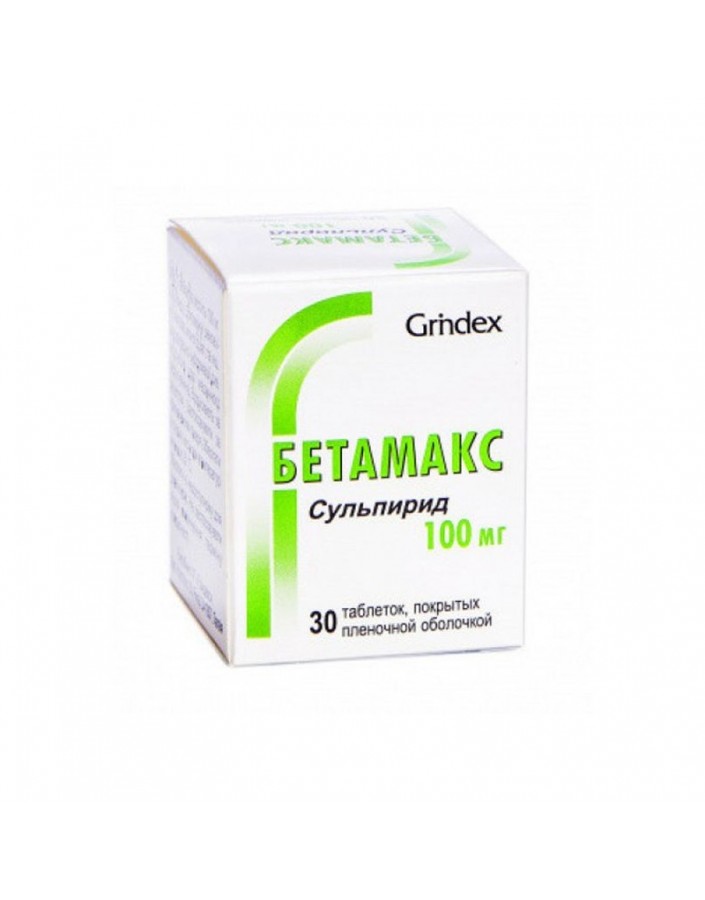



BETAMAX PILLS 100MG - 30 tabs

Security policy (edit with Customer reassurance module)

Delivery policy (edit with Customer reassurance module)

Return policy (edit with Customer reassurance module)
Composition and release form:
| Coated Tablets | 1 tab. |
| sulpiride | 50 mg |
| 100 mg | |
| 200 mg |
in plastic bottles of 30 pieces.
Characteristic:
Atypical neuroleptic from the group of substituted benzamides.
Pharmachologic effect:
Blocks dopaminergic receptors of the limbic system (slightly affects the non-striated system). It has no significant effect on the noradrenergic, acetylcholine, serotonin, histamine and GABA receptors.
Pharmacokinetics:
After ingestion Cmax achieved in 1.5–3 h. Bioavailability - 27%. Plasma protein binding is less than 40%. Concentration in the central nervous system is 2–5% of the concentration in plasma. It is excreted in breast milk. Not metabolized. Excreted mainly unchanged by the kidneys. In patients with moderate to severe renal insufficiency T1/2 increases and is 20-26 hours (after i / v injection).
Pharmacodynamics:
The peripheral effect of the drug is based on the inhibition of presynaptic receptors (an improvement in mood is associated with an increase in the amount of dopamine in the central nervous system, and the development of symptoms of depression - with a decrease). The antipsychotic effect of the drug is manifested in doses of more than 600 mg per day, stimulating and anti-depressive in doses up to 600 mg per day.
In small doses, it can be used as an adjuvant in the treatment of psychosomatic diseases, including for the relief of negative mental symptoms of gastric ulcer and duodenal ulcer. In irritable bowel syndrome, it reduces the intensity of abdominal pain and leads to an improvement in the patient's clinical condition.
Low doses (50–300 mg per day) are effective for dizziness, regardless of etiology. It stimulates the secretion of prolactin and has a central antiemetic effect (inhibition of the emetic center).
Indications:
Schizophrenia (acute and chronic), delirious state, depression, neurosis, dizziness, incl. with vertebrobasilar insufficiency, vestibular neuritis, Meniere's disease, traumatic brain injury, otitis media. Peptic ulcer and duodenal ulcer and irritable bowel syndrome (as an adjunctive therapy).
Contraindications:
Hypersensitivity; acute alcohol poisoning, hypnotics, analgesics; hypertension stage II-III; pheochromocytoma, epilepsy; hyperprolactinemia; state of passion and aggression, breastfeeding period, child age (up to 14 years).
Use during pregnancy and lactation:
Not recommended during pregnancy, except when the expected effect outweighs the potential risk to the fetus. At the time of treatment should stop breastfeeding.
Side effects:
From the nervous system and sensory organs: drowsiness, dizziness, sedation, rarely - extrapyramidal syndrome, dyskinesia, oral automatism, aphasia, agitation, sleep disorder, very rarely - neuroleptic malignant syndrome.
Since the cardiovascular system and blood (hematopoiesis, hemostasis): increased blood pressure, rarely - orthostatic hypotension.
On the part of the digestive tract: dry mouth, heartburn, vomiting, constipation.
Metabolism: reversible hyperprolactinemia (galactorrhea, menstrual disorders, rarely - gynecomastia, impotence, frigidity).
Allergic reactions: skin rash, itching.
Other: hyperthermia, increased sweating, weight gain.
Interaction:
Enhances the sedative effect of narcotic analgesics, antihistamines, barbiturates, benzodiazepines and other anxiolytics, alcohol.
The simultaneous administration of levodopa (mutual antagonism) should be avoided. When taken simultaneously with antihypertensive drugs increases the risk of orthostatic hypotension.
Dosage and administration:
Inside in the morning (up to 16 hours), due to increased wakefulness. The maximum daily dose is 1600 mg.
Schizophrenia, delirious psychosis: the initial dose is 600–1200 mg per day, in several doses; supporting - 300-800 mg per day.
Depression: from 150–200 mg to 600 mg per day in divided doses.
Dizziness: 150-200 mg / day, in severe conditions - up to 300-400 mg per day.The course of treatment is at least 14 days.
Peptic ulcer and duodenal ulcer, irritable bowel syndrome as an adjunctive therapy: 100–300 mg per day in 1-2 doses.
Elderly patients: initial dose - 1 / 4-1 / 2 doses for adults.
Children over 14: 3-5 mg / kg.
With Cl creatinine 30–60 ml / min, the dose is 70% of the standard or 1.5 times the interval between doses increases; with Cl creatinine 10–30 ml / min - 50% or 2 times; less than 10 ml / min - 34% or 3 times (dose reduction or increase in the interval between doses, respectively).
Overdose:
Symptoms: blurred vision, arterial hypertension, sedation, nausea, extrapyramidal disorders, dry mouth, vomiting, increased sweating, gynecomastia.
Treatment: symptomatic therapy.
Precautionary measures:
With caution prescribed to patients with impaired renal function, diseases of the heart and blood vessels, parkinsonism, and young women with irregular menstrual cycle. With the development of hyperthermia, the drug should be discontinued. It is recommended to take in the first half of the day (up to 16 h) due to the increased level of wakefulness. Should not be used while working drivers of vehicles and people whose profession is associated with increased concentration of attention.
Do not drink alcohol during treatment.